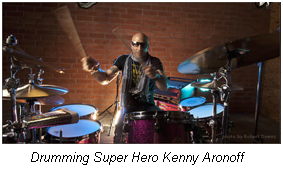 Who do you want to be when you grow up? Or to rephrase this question for someone who plays the drums, what drummer do you most want to play like?
Who do you want to be when you grow up? Or to rephrase this question for someone who plays the drums, what drummer do you most want to play like?
Usually it’s a drum fill or the way they play a favorite song that gets you interested in a drummer. And the more you listen to them the more you like what they play. Soon you can imagine yourself playing just like them, maybe even taking their place in their current band.
It’s a great learning experience and a lot of fun to research a famous drummer’s background. I use drum heroes to further not only my playing ability but also my musical career. I try to learn from what they play AND from their musical experiences.
Who Are My Drum Heroes?
I’ve had many drumming heroes over the years. These are drummers who I read about, listened to and tried to sound like.
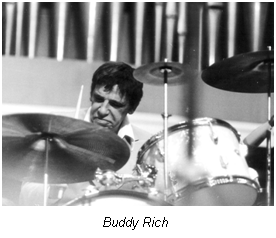 I started by trying to imitate the drummer on a live broadcast for a local radio station in Portland, OR. That led me to the great big band drummer Buddy Rich. I soon discovered Bobby Colomby from Blood, Sweat & Tears, and Danny Seraphine, the drummer for the band Chicago.
I started by trying to imitate the drummer on a live broadcast for a local radio station in Portland, OR. That led me to the great big band drummer Buddy Rich. I soon discovered Bobby Colomby from Blood, Sweat & Tears, and Danny Seraphine, the drummer for the band Chicago.
I went through a hard rock phase where I listened to John Bonham of Led Zeppelin, Ian Paice from Deep Purple, the original Yes drummer Bill Bruford, and Carl Palmer with Emerson, Lake & Palmer.
My big band phase continued. I had a chance to see Ralph Humphrey with The Don Ellis Orchestra, Peter Erskine with Maynard Ferguson and Jeff Hamilton with Woody Herman. Those guys were my heroes as I learned how to play with a big band in school.
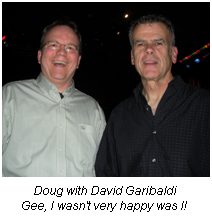 Listening to jazz-rock fusion led me to Billy Cobham (Mahavishnu Orchestra) and Lenny White (Return to Forever). And there were the funk years when I couldn’t learn enough about drum heroes David Garibaldi from Tower of Power and Harvey Mason who played on Herbie Hancock’s Headhunters album. I also explored small group jazz players like Philly Joe Jones and Tony Williams with Miles Davis.
Listening to jazz-rock fusion led me to Billy Cobham (Mahavishnu Orchestra) and Lenny White (Return to Forever). And there were the funk years when I couldn’t learn enough about drum heroes David Garibaldi from Tower of Power and Harvey Mason who played on Herbie Hancock’s Headhunters album. I also explored small group jazz players like Philly Joe Jones and Tony Williams with Miles Davis.
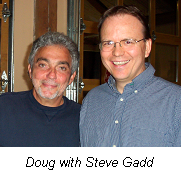 Then came my fascination with studio players Steve Gadd and Vinnie Colaiuta. In fact, I’ve probably spent more time studying Steve Gadd than all the others combined. Vinnie’s early playing with Frank Zappa still baffles me.
Then came my fascination with studio players Steve Gadd and Vinnie Colaiuta. In fact, I’ve probably spent more time studying Steve Gadd than all the others combined. Vinnie’s early playing with Frank Zappa still baffles me.
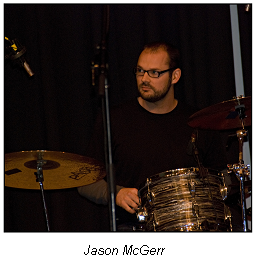 In the 90’s Dave Grohl from Nirvana was a hero. Then the 2000’s had me admiring Jason McGerr, the drummer for Death Cab for Cutie. I started listening to more country music and discovered Greg Morrow, studio drummer on Carolyn Dawn Johnson’s album Room with a View. I also admire Chris McHugh, Keith Urban’s regular drummer.
In the 90’s Dave Grohl from Nirvana was a hero. Then the 2000’s had me admiring Jason McGerr, the drummer for Death Cab for Cutie. I started listening to more country music and discovered Greg Morrow, studio drummer on Carolyn Dawn Johnson’s album Room with a View. I also admire Chris McHugh, Keith Urban’s regular drummer.
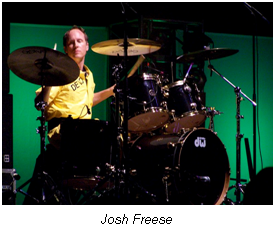 My latest drum heroes are more behind-the-scenes drummers. Guys like Kenny Aronoff who plays for John Fogerty and Chickenfoot, Abe Laboriel, Jr. who is with Paul McCartney, and Josh Freese, a great session drummer who plays for Devo, Weezer & Sublime. These guys energize every musical situation with lots of positive energy. They know how to play for the song by playing feel-good grooves with just the right fills.
My latest drum heroes are more behind-the-scenes drummers. Guys like Kenny Aronoff who plays for John Fogerty and Chickenfoot, Abe Laboriel, Jr. who is with Paul McCartney, and Josh Freese, a great session drummer who plays for Devo, Weezer & Sublime. These guys energize every musical situation with lots of positive energy. They know how to play for the song by playing feel-good grooves with just the right fills.
How to Worship a Drum Hero
Worship is probably too strong a word but it gets the point across, right? What’s the best way to learn more about your drum hero? Here are some steps that I’ve used in the past to find out more about a famous drummer:
- Learn about your drum hero’s background. Where did they grow up? How early in life did they start playing the drums? Did they take drum lessons? Who was their drum teacher? Were they self taught?
- Find out who influenced your drum hero. Who were their early influences? Who did they listen to when they were learning to play the drums? Who do they listen to today?
- Listen to your drum hero’s playing starting with early recordings. Try to find their first album of songs and, if possible, listen to at least one collection of music (say, 10 songs) for each year they’ve been playing.
- Analyze your drum hero’s playing. What did they play on their earliest recordings? How did they improve from one year to the next? Did their playing get more or less busy as they got older?
- Find out what your drum hero is thinking about and working on today. What are they currently doing? What are their plans for the future?
- Try to imitate your drum hero’s playing. Play along with their recordings. Learn their drum beats and copy their fills.
- Adapt what you’ve learned from your drum hero for your own playing. Make up your own versions of your drum hero’s beats and fills.
Now use what you’ve learned from your drum hero to develop your own style. Take what they play and add your own twist. Your drum hero can provide a powerful foundation on which you can build your own drumming approach!
